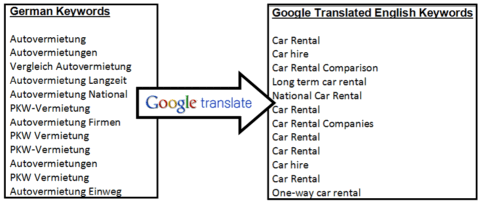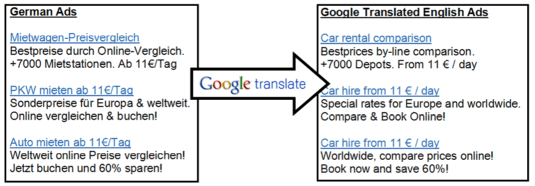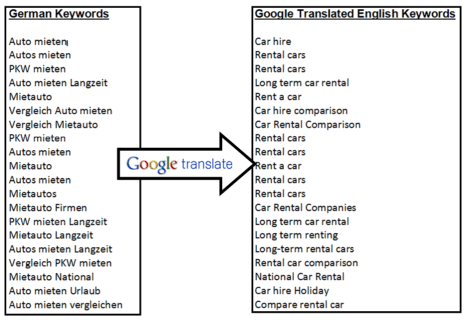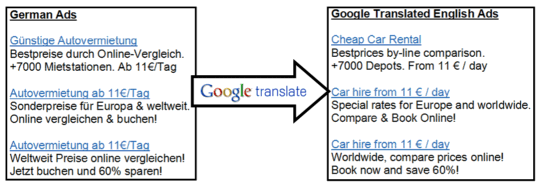Google have created a toolkit for translating AdWords campaigns into other languages. It machine-translates using Google Translate, and then allows a professional translator, or mother-tongue linguist to go in and correct the inevitable errors that machines make when translating.
However, we show in this article that the Google process has some major issues. The over-simplification of the translation process will lead to massive missed opportunity for their clients, and potentially failing campaigns. Using Google’s process you will only succeed in a relatively immature market, and unless you fix it fast, you will get swallowed up by competition.
The problem comes when translating campaigns. Using Google’s recommended method, if you have a campaign with 20 ad groups and 1000 keywords, your translated campaign, in German for example, will contain 20 ad groups and 1000 keywords. This is a gross over-simplification.
To demonstrate the process, we have used Google’s tools to translate a successful German car rental campaign from German into English (so you can understand the results). We have picked on two ad groups for simplicity. Each of these ad groups centre on a certain term for ‘car rental’ in German. See the sample set of the results below.
Ad Group 1 – Translated Keywords:

Ad Group 1 – Translated Ad Texts:

Ad Group 2 – Translated Keywords:

Ad Group 2 – Translated Ad Texts:

The first thing to note is that the translations are actually pretty good. There are no wild errors in there. Therefore, as a professional translator with the job of verifying the quality of the results I would say that these results are largely OK.
As a search marketer, however, we have to ask ‘are these new English ad groups good and ready to compete on line?’
The answer is a resounding ‘no’. These ad groups are nowhere near. The reasons are as follows:
- Each ad group contains a mixture of terms for ‘car hire’ and ‘car rental. Any PPC manager would tell you that this is not correct. These are such big terms that the ad groups should be built off these seed words (in fact, exactly as the German ad groups were in the first place).
- The auto translate function will always choose the best fitting words for the translation. Therefore other important search terms with no German equivalent will never be discovered. ‘Rent a car’ ‘car rent’ ‘vehicle hire’ and other such terms will be missing from the campaign.
- In the simple example above, it can be seen that there are examples of German keywords that translate to repeating English words. ‘Autos mieten’ and ‘Mietautos’ both translate to ‘rental cars’. Both good translations, but you can see the obvious dilution of ideas.
- The ad text is not good enough. Ad text is critical for a campaign’s success. We all know that in English there are certain rules that must be followed (such as keyword in the headline, call to action or reason to click in body line 2, keyword placement offset in body copy), then ideas need to be tried that will appeal to the searcher. Ads are very sensitive. Some work and some don’t. To suggest that we can take an idea that works in one language, translate it, and expect it to be a good ad in another language is ludicrous. In the example above, one of the ad texts has the title containing the term ‘car rental’ and the other two have been translated as ‘car hire’. Given that this issue has arisen with the keywords also, we are clearly in a mess.
- Building a campaign in this way suggests that the linguistic elements required are a one-off process at the time of set up. However, we know from running English campaigns that throughout the life of the campaign there is much input required that relies on knowledge of what the keywords actually mean. Analysis of the search queries used to trigger the ads on day one of the campaign will reveal that Google will be showing the ads on many terms that we are not bidding on specifically. These may be bad terms (and require removal via negative matching), or good terms (and may need a specific keyword or even ad group). This work is essential, and is very intensive in the early phase of the campaign. Performing this ‘keyword cleaning’ (as we call it here at Search Laboratory) has a huge effect on the cost per conversion in the first days and weeks of the campaign. Google translate cannot help with ongoing campaign management.
The actual campaign that these examples are taken from has over 200 ad groups. If we had translated the whole campaign in this way we would face major work to get it in good shape if we want to maximise the new market.
The approach is not right. In order to create an optimised campaign in another language, it needs to be built the way the original campaign was built “ by a mother-tongue search marketer who can perform keyword research and expand out using the nuances of their language. Sure, the English campaign can be used to seed ideas. Here at Search Laboratory, we use a language-agnostic account brief to expand out into the different languages. Key points about this process:
- The number of ad groups required is entirely dependent on the language, and the popular terms in that language.
- The keywords need to be expanded out from keyword research, detailed knowledge of AdWords optimisation requirements, competitive analysis etc.
- Ad texts must be compelling for that market.
The fact that in English we have a number of big popular ways of saying ‘car rental’ does not mean that in German they have the same number. Compelling ad text messages in another language are not translations of compelling messages in English.
Google has a new initiative to push export. Apart from the obvious advantages this has for Google (it gets us all spending more on AdWords), it is a really great idea. We have been performing multilingual search marketing for many years, and for many clients this means cheaper clicks in less competitive markets with often higher conversion rates. Therefore they tend to get cheaper sales in foreign markets than in the home market. Right now with the way the currency markets are sitting, it is even more attractive as British goods are cheaper for overseas buyers. Google have packaged up a set of services called ‘Export Box’ which provides companies with discounted translation, access to exporting expertise, and a £200 AdWords voucher. The package is excellent value. However, beware of allowing your standard agency or translation company to translate your campaigns.
Google’s Export Box is a great idea and people considering exporting should take up the offer of discounted translation of collateral, a £200 AdWords voucher, and other benefits. However, they must ensure that the campaign is created by search experts who specialise in multilingual campaigns. Many claim this, but there are only a handful of companies that are truly specialists. Search Laboratory is one of those, but there are also companies such as Web Certain, Big Mouth Media and Oban (apologies if I have missed anyone). Most of the others will use a translation company to translate campaigns in the way Google advocates.
Summary Recommendations
- Use Export Box “ it is a fantastic deal
- Check your PPC campaigns are localised properly. Call us for some impartial advice on this.
About the Author
Ian Harris has worked in website internationalisation and multilingual search engine optimisation for the last ten years. Prior to that he programmed e-commerce applications. He has helped many companies take their web presence abroad, including British Airways, IBM, Novell and HSBC. He is the founder and CEO of Search Laboratory, a multilingual search engine marketing company.


